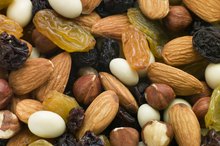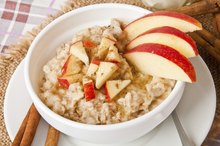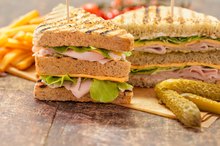Diet After an Anal Fistula Surgery
Painful but uncommon injuries that develop most frequently in people with chronic intestinal disorders, such as Crohn’s disease, anal fistulas usually require surgery to heal. An anal fistula forms an abnormal channel between the anal canal and the skin near the anus, often following an intestinal infection or abscess in the anus. Surgery to drain the abscess, called a fistulotomy, allows the infection to heal and the abnormal channel to close. After anal fistulotomy, the right diet can help prevent complications.
After-Surgery Effects
You may experience mild to moderate pain for up to a week after a fistulotomy. If you experience pain, you may try to avoid passing stool, which can lead to more severe constipation. Keeping stools soft and bulky helps them move easily through the gastrointestinal tract. Pain medication used after surgery can also have constipating effects. Your doctor may also prescribe laxatives or stool softeners after surgery.
- You may experience mild to moderate pain for up to a week after a fistulotomy.
- If you experience pain, you may try to avoid passing stool, which can lead to more severe constipation.
High-Fiber Diet
Fiber Foods and Messy Stool
Learn More
Following a high-fiber diet after surgery bulks up the stools and also keeps them soft by drawing water into the stool from the intestine. High-fiber foods include fruits and vegetables as well as whole grains. Eat four servings of fruits and vegetables and four servings of cereal and other whole grains to prevent constipation. Keeping the skin on fruits and vegetables provides extra fiber. Fiber in wheat and oat bran may be more effective in preventing constipation than fruits and vegetables. Try to include at least 20 g of fiber if you’re female and 30 to 35 g if you’re male.
- Following a high-fiber diet after surgery bulks up the stools and also keeps them soft by drawing water into the stool from the intestine.
- Fiber in wheat and oat bran may be more effective in preventing constipation than fruits and vegetables.
Fluids
You must increase your fluid intake when you increase your fiber intake, or stools could become large and hard. Intestinal blockage, a potentially serious complication, can occur if stool can’t pass. Drink at least eight to 10 8-oz. glasses of fluid during the day to keep stools soft. Avoid drinks that contain caffeine, which can worsen constipation, because caffeine has a dehydrating effect.
- You must increase your fluid intake when you increase your fiber intake, or stools could become large and hard.
Considerations
Avoidable Causes of Constipation After Starting a New Diet
Learn More
If you become constipated after surgery, you can easily retear an anal fissure. Complete healing may take several weeks, so take care to keep stools soft. Anal fissures can also recur, so make high-fiber foods and extra fluid part of your normal diet. Increased pain and rectal bleeding may indicate a new fissure. Increase your fiber intake slowly, or you could develop uncomfortable abdominal distention and gas.
- If you become constipated after surgery, you can easily retear an anal fissure.
- Increase your fiber intake slowly, or you could develop uncomfortable abdominal distention and gas.
Related Articles
References
- University of Wisconsin: Anal Fissure/Fistulotomy/Sphincterotomy Surgery
- University of Michigan Health System: Anal Fistula
- American Heart Association. Whole grains, refined grains, and dietary fiber. Updated September 20, 2016.
- Sugerman DT. Anal fissure. JAMA. 2014;311(11):1171. doi:10.1001/jama.2014.214
- Gardner IH, Siddharthan RV, Tsikitis VL. Benign anorectal disease: hemorrhoids, fissures, and fistulas. Ann Gastroenterol. 2020;33:9-18. doi:10.20524/aog.2019.0438
- Mapel DW, Schum M, Von Worley A. The epidemiology and treatment of anal fissures in a population-based cohort. BMC Gastroenterol. 2014;14:129. doi:10.1186/1471-230X-14-129
- Lang DS, Tho PC, Ang EN. Effectiveness of the Sitz bath in managing adult patients with anorectal disorders. Jpn J Nurs Sci. 2011;8(2):115-28. doi:10.1111/j.1742-7924.2011.00175.x
- American Heart Association. Whole grains, refined grains, and dietary fiber. Updated September 20, 2016.
- Cleveland Clinic. Anal fissures: Management and treatment. Updated February 22, 2019.
- American Society of Colon & Rectal Surgeons. Anal fissure expanded information.
- Cleveland Clinic. Anal fissures: Prevention. Updated February 22, 2019.
- U.S. Department of Health and Human Services and U.S. Department of Agriculture. 2015 – 2020 Dietary Guidelines for Americans. 8th Edition. December 2015.
Writer Bio
A registered nurse with more than 25 years of experience in oncology, labor/delivery, neonatal intensive care, infertility and ophthalmology, Sharon Perkins has also coauthored and edited numerous health books for the Wiley "Dummies" series. Perkins also has extensive experience working in home health with medically fragile pediatric patients.









